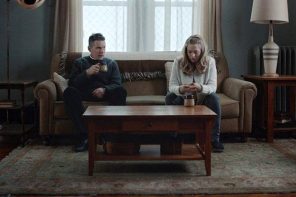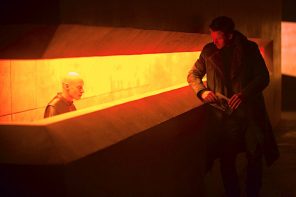In one extraordinary moment of cinematic history, a sleeping woman awakes. A series of still images focus on her resting face, tumbling after each other until… movement. Eyelids open, mouth cracks a half-smile—the slightest of gestures that release the spellbound viewer.
The scene occurs two-thirds of the way through Chris Marker’s fifty-year-old, post-apocalyptic masterpiece, La Jetée, a “motion picture” made up entirely of still images, save this one. Marker, who died on July 30 at age 91, made La Jetée on a shoestring budget with minimal music, slight voiceover narration, and black-and-white stills that pack the half-hour work with a wealth of worldly hopes and fears. (Terry Gilliam remade the gist of Marker’s narrative in 1995 and released it as the feature-length Twelve Monkeys).
At the outset we learn World War Three has occurred, nuclear bombs have been dropped, the end is at hand. A band of underground survivors experiment with breaking out of history, hoping to live on, somehow, into the future. Humanity’s hope rests with the ability of a single man to remember an image, an image of a face, an image that enables him—with a drug-induced haze—to slip back and forth in time, and to find in the future a remedy that allows him to redeem humanity. The climactic events occur on a Sunday. Music throughout is taken from the Russian Liturgy of the Good Saturday. But if we stopped with Christological comparisons we would miss a great deal of the strength of this or any film by Marker.
Marker was perpetually interested in travel; across time and through space. And while these are ostensibly the themes of sci-fi and travelogues, he cleared paths to reveal our human-religious sensibilities as journeying creatures who remember, who experience the sensual world, who communicate in smell and touch and sound and sight. Hitchcock was his ancestor, Christopher Nolan his descendent. Marker is an exemplar of the late artist Louise Bourgeois’ claim that, “All we have to open the past are the five senses… and memory.”
So is the narrator of his 1983 Sans Soleil: “We do not remember. We rewrite memory much as history is rewritten. How can one remember thirst?” Through his films, videos, writings, and multimedia works we wind up “In the beginning,” “After the end,” “From a far off country.” Our sensate bodies move there, then.
Sans Soleil is an amalgamation of travel narrative, ethnography, and fiction film, offering global views of death and life, and the rituals of the mundane and sacred. Here, and in other films like Level Five (1997), the constant pretext is of communication between two people who are separated across time and space. Words spoken or on postcards, images still and moving, create connection.
While it lacked the overarching impact of La Jetée and Sans Soleil, the image from Level Five that sticks in my eye years later is of a woman receiving computer messages from elsewhere. She is attempting to learn about the Battle of Okinawa through a computer game. To get the messages, she would insert the olfactory equivalent of earbuds into her nostrils, smelling the symbolic gestures from far away. It’s a philosophical abstraction whose reality is hindered by the very audio-visuality of the medium, but its visible odor has stuck with me. The truth of history, like myth, can only be approached as a sensual experience.
Marker has claimed that the single moving image from La Jetée occurred because he could only afford a movie camera for one afternoon. Such enigmatic statements coalesce well with his enigmatic persona, as reclusive as Salinger or Pynchon. Through anonymity, pseudonymity, and the crossing of subjective and objective points of view, Chris Marker created an extraordinary body of work, while living and hiding in France and across the world for nine decades.
A philosopher in and of audio-visual media, Marker did digital storytelling before the term was coined and imagined electronic communications to degrees still unfathomable to most. He was no practicing religious person, as far as anyone can tell, but his very mode of creation enriches a religious sensibility. As the unnamed woman of La Jetée stirs amidst still-lifes, so did Chris Marker open cinematic eyes to the wonders of the global and eternal in the blinking of an eye.



